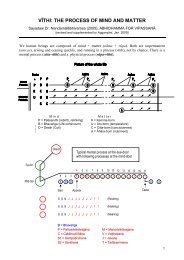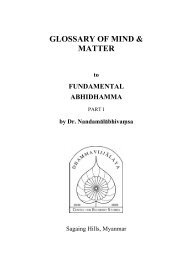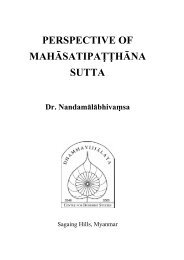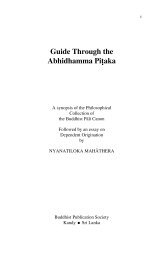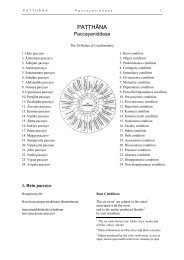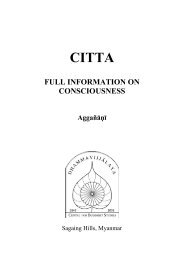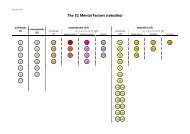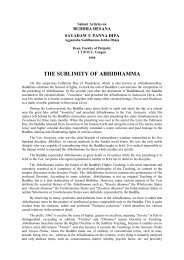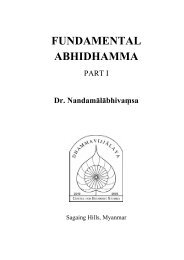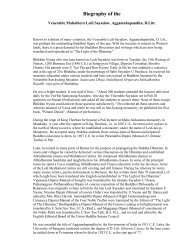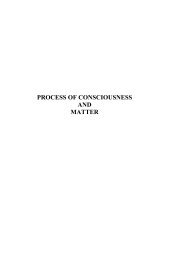ABHIDHAMMA IN DAILY LIFE - Abhidhamma.com
ABHIDHAMMA IN DAILY LIFE - Abhidhamma.com
ABHIDHAMMA IN DAILY LIFE - Abhidhamma.com
You also want an ePaper? Increase the reach of your titles
YUMPU automatically turns print PDFs into web optimized ePapers that Google loves.
your post volition cetana is spoiled but also you develop an evil attitude of dissatisfaction<br />
(akusala dosa).<br />
6.2.4 Comment<br />
Building monasteries, constructing pagodas, etc. are Charity of great magnitude. There is also<br />
Charity of less magnitude when you offer alms or garments or when you give food, water, etc; to<br />
the needy. In giving charity of a great magnitude, you are liable to encounter interference from<br />
within yourself as well as from malicious elements.<br />
Therefore, if you plan to perform Charity of great magnitude you should not only plan for<br />
yourself but also seek good advice from friends and learned teachers. Only then, you will get<br />
worthy recipients for your Charity. Choice of recipient is not so important in doing Charity of<br />
small magnitude; even feeding animals has its own merit. The crucial factor in doing Charity is<br />
to have the right attitude.<br />
• Try to perform charity to the order of Monks whenever possible.<br />
• Never be attached to the offertories you intend to donate.<br />
• Let your mind be filled with <strong>com</strong>plete renunciation of the material things that you have<br />
set aside for charity.<br />
So all donors should bear in mind not to be attached to the recipient; not to be attached to the<br />
offertories; not to pray or long for worldly luxury in the abode of humans and Devas; but only to<br />
have the noble desire to attain the supreme bliss of Nibbána. This will make you the ideal donor.<br />
6.4 The Classification of Good Deeds (Kusala)<br />
Bear in mind that non-attachment, non-hatred and non-delusion are the three roots of doing<br />
wholesome Charity. Like the roots of a tree, which support the whole organism to be vigorous,<br />
these roots cause growth and development of the corresponding mind and consciousness..<br />
There are two types of good minds. :<br />
a. A good mind associated with two roots – non-attachment and non-hatred. .<br />
b. A good mind associated with all three roots – non-attachment, non-hatred and non-delusion.<br />
6.4.1 Mind associated with two – non-attachment and hatred<br />
When a person fosters a good mind with non-greed and non-hatred, his meritorious mind<br />
belongs to right belief. It is his/her acceptance of the cause and effect of kamma.<br />
Today, many Buddhists perform charities and alms giving customarily without the proper<br />
knowledge about kamma and its effect. Such generosity has two roots. Even the learned do-good<br />
deeds perfunctorily, so their wholesome deed falls into the same category. Briefly, all good<br />
Page 49 A Gift of Dhamma Maung Paw, California




